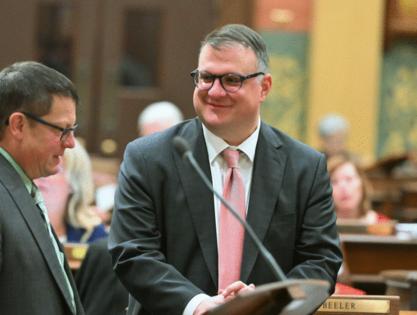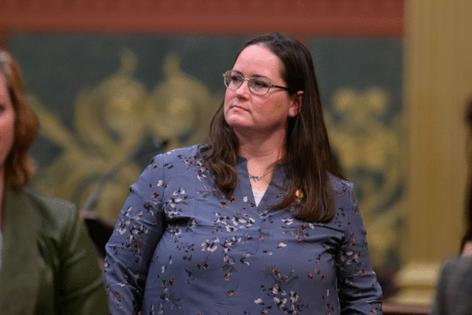Michigan lawmakers seeking billions of dollars for nearly 800 pet projects
Published in News & Features
LANSING, Mich. — Michigan lawmakers made nearly 800 requests totaling an estimated $4 billion to fund pet projects for communities and not-for-profit organizations across the state through a new, fully public earmark request process implemented after years of backroom dealmaking that concealed the names of lawmakers seeking earmarks.
The requests, which are disclosed on the House website, run the gamut from road and sidewalk repairs to park improvements, new firehouse roofs and firetrucks. House Republican leadership estimated the total amount requested came to about $4 billion.
However, the vast majority of those requests likely will be left on the cutting room floor of the House Appropriations Committee.
House Speaker Matt Hall, a Richland Township Republican, said the House budget will likely only devote about $100 million toward earmarks in its budget proposal.
"Our proposals are built on about $100 million," Hall said of the House's road funding plan, which accounts for about $500 million in cuts to earmark funding. "If you went beyond $100 million, then you would really have to start cutting from departments, honestly."
The new method for managing the earmark process comes after several years of pet projects being tucked into spending bills hours before lawmakers voted on the multi-billion-dollar state budget, leaving little time to read or raise questions about the earmarks. Past spending plans have included up to $1 billion for controversial projects cherry-picked by lawmakers with little information on who the money will benefit or why it's considered a public good.
Several Detroit News investigations raised questions about the glut of earmarks, a type of no-bid grant requested by a lawmaker for his or her district that is also referred to as a pet project, pork or pork barrel spending.
In some instances, money went to nonprofits that hadn't yet been formed, others went to for-profit businesses, others went to businesses where the ownership was unclear and one went to a project managed by a lawmaker's brother's organization. Some lawmakers didn't know about projects in their own districts, and others received contributions from the groups receiving the funding right before or after the budget was approved.
In January, when Republicans took up the House gavel, lawmakers voted 105-0 to require sponsors of earmarks in the state budget to be publicly disclosed weeks ahead of the final budget approvals. The new rules also force lawmakers to clearly define the public good of the project and would prohibit for-profit entities or newly hatched nonprofits from receiving specially dedicated money.
State Rep. Ann Bollin, chairwoman for the House Appropriations Committee, said each of the more than 800 requests would be reviewed "to ensure any projects that move forward truly serve the public and make a positive difference in our communities.”
"If we’re going to make smart, responsible investments, the good projects need to be on the table for consideration — and that’s exactly what this new public process has accomplished," Bollin said.
On Thursday, Hall said that past budgets likely included $4 billion or more in requests, but because the process occurred behind closed doors, the true cost of line-item projects was never clearly outlined.
"The real shady ones, those ones didn't even get proposed this time because they couldn't find sponsors," Hall said. "It's probably the same amount of requests. It's just a formal process, so we all see it. And then it's a matter of taking the ones that are most important and funding those. But our goal is to reduce the earmarks."
In past budget cycles, House and Senate Democrats and Republicans and the governor were each given a portion of money they could spend on earmarks that were added at the last minute to the budget. The last couple of budget cycles in 2023 and 2024 were different, though, Hall said.
"When I was minority leader, I did not get a pot of money," Hall said. "But we all opposed the budget."
It remains to be seen how the House's new rules will clash with the Democratic-led Senate's process. The Senate has no such advance-disclosure rule and the House said it will not consider earmarks that have not gone through its advance disclosure policy.
Rosie Jones, a spokeswoman for Senate Majority Leader Winnie Brinks, said she would not weigh in on the House process. The Senate, she said, will follow its normal process, which does require some disclosure of sponsorship after the budget is passed.
New round of funding requests
The highest-dollar requests appear to center on infrastructure needs in local communities, from roads and bridges to water and sewer to municipal and public safety buildings.
Many of the lawmakers The News spoke with Thursday noted that they were happy with the new request process, though they were keeping their expectations low for whether they would actually secure any funding for projects in their districts.
One of the highest dollar amounts requested came from state Rep. Brian Begole, R-Perry, who asked for $207 million in funding for a "generational reinvestment" in Owosso's water and sewer infrastructure. Begole said the city's infrastructure is in desperate need of help, and without additional aid, residents' bills could increase by 166%.
The mid-Michigan city of about 14,500 residents has "done its homework" and exhausted other funding options, such as a state revolving fund for water and sewer projects, he said.
"Do I expect all of that to be granted? Certainly not," Begole said. "I know that’s a lot of money. But anything I can do to help them with that cost, I’ll do it.”
State Rep. Timmy Beson, R-Bay City, acknowledges he made more requests than he planned in part because his area still does not have a state senator who can advocate for it in the upper chamber. The 35th Senate District seat has remained vacant since January, when former state Sen. Kristen McDonald-Rivet, D-Bay City, took up her seat in the U.S. House of Representatives.
Beson said he was initially uncertain about the new process for requesting earmarks but found that, in the long run, it created an opportunity to show his communities, in writing, that he was advocating for their priorities in Lansing.
"I think it's about time people see what you’re fighting for,” Beson said. "And when I had to learn about every project and I had to put my name to it, you're more hesitant to take on some."
Among Beson's requests were about $600,000 for a workforce development program in Saginaw County, about $1 million for per- and polyflouralkyl substances (PFAS) cleanup at Bay City fire stations, $4.6 million for PFAS cleanup at Middleground Landfill and about $25 million for a centralized public safety building in Bay City.
State Rep. Kathy Schmaltz, R-Jackson, requested, among a list of projects, about $1 million for a community shelter, about $5 million for an expansion of a personal finance and career prep program, and $1 million for a group that provides rides to medical appointments. Schmaltz said she's an optimist regarding her chances of getting funding for her priorities.
"Regardless of what happens with this budget process, I will look for grants in other places if we don’t get what we need to make sure we get it somewhere," Schmaltz said.
Rep. Carrie Rheingans, D-Ann Arbor, put her name behind a $1.2 million YMCA Youth in Government program grant and $450,000 for a ladder truck for Scio Township's fire department.
But Rheingans has warned those seeking the grants that their chances of getting funding are slim, especially given potential spending cuts at the federal level.
If the choice is between $100 million for earmarks and bridging a healthcare funding gap due to reductions in the Medicaid health insurance program for low-income residents, Rheingans said she'd seek to ameliorate the federal cuts any day.
"I think it’s irresponsible of us as legislators to let people think that we’re going to be able to give them state dollar earmarks in a year where were going to have less overall funding in the budget for a variety of reasons," Rheingans said. "We need to prepare to have fewer federal dollars."
©2025 www.detroitnews.com. Visit at detroitnews.com. Distributed by Tribune Content Agency, LLC.










Comments